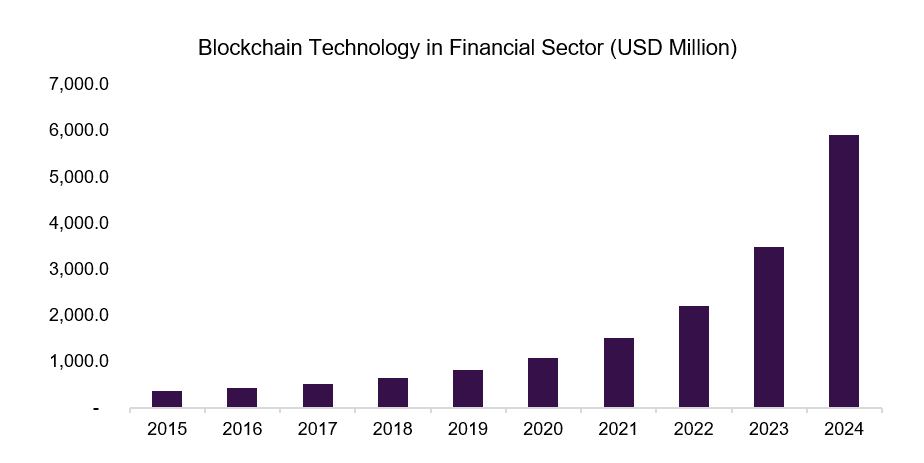
Prepare for Blockchain to transform business and technology throughout 2019. Blockchain turns ten years old on January 3, 2019 and, as a maturing technology, will gather momentum throughout this next year. By 2020, 56 percent of large enterprises plan to adopt Blockchain-enabled technology — up from one quarter now. According to Gartner’s Blockchain Spectrum, Blockchain-enabling technologies will leading to complete offerings and full value proposition by 2020.
Blockchain is still unproven. As Richard Hunter, Vice President and Gartner Fellow, suggests, “Potential use cases are numerous, but real-world examples of those use cases in action at scale are nowhere to be found.” David Cearly, Vice President and Gartner fellow, acknowledges that “Current blockchain technologies and concepts are immature, poorly understood.” However, Blockchain understanding will grow in leaps and bounds in 2019 and in unanticipated ways.
Already stock markets have made inroads to speed up and simplify trades. Singapore has launched a prototype using Blockchain for delivery, payment, and settlement of assets, and Australia has moved furthest to replace its main clearing and settlement platform with Blockchain. In fact, many of Blockchain successes will most likely emerge from the realm of managing Big Data and streamlining business activities.
Alison McCauley, CEO of Unblocked Future, suggests many Blockchain uses will come from the non-IT realm. By the end of 2019, Blockchain will trend toward non-direct financial and more Big Data exchange use cases, spur an increase in digitized government services and potentially lead to “data institutions” where consumers can entrust their data security. These clearinghouses could handle the messiness of data asset transactions between consumers and businesses using Blockchain.
Why is Blockchain Technology Unique?
Any business transaction, including information transfer, requires trust and reciprocity, and fast and effective exchanges — including Big Data exchange. Currently, centralized authorities (e.g. regulators and auditors, government authorities, and banks) provide a backbone of integrity.
Blockchain technology provides a mechanism to add more trust, providing transparency and reducing the need for so many intermediaries. Blockchain technologies shine with these unique strengths:
- Flexibility: Blockchains store any kind of digital information, including computer codes that can be executed after the appropriate parties enter their keys.
- Decentralized and Distributed Structure: “No single individual or company has control of the data entry or its integrity. The accuracy of the Blockchain is continuously verified by each computer in the network.”
- Enhanced Security: Blockchain is very hard to hack. Should a record’s data change, this could be retroactively examined, revealing answers about when and who.
These Blockchain advantages translate to streamlined business processes, new business models, and industry transformation way beyond bitcoins and into the realm of Data Asset Management.
Blockchain: A Currency for Data Asset Exchange
Blockchain will become a prominent currency for Data Asset Exchange in 2019. In his presentation on The Blockchain Scenario, David Furlonger, predicted that Blockchain solutions will be “designed to address a specific operational issue — most often in terms of inter-organizational process or record keeping inefficiency.” This has special relevance in data transfer.
For example, information trade among distributers, partners, and customers within the supply chain and using Blockchain are proving successful. McKesson, a leading healthcare company for wholesale medical supplies and equipment, needed to trace certain prescription drugs to comply with the Drug Supply Chain Security Act (DSCSA). The company is working with the industry toward the ability to verify returns for the November 2019 deadline and is looking toward the November 2023 full serialization requirements.
Scott Mooney, Vice President, Distribution Operations for McKesson Pharmaceuticals, sees Blockchain as an “aid in the lookup directory for returns” and to “perhaps aid in facilitating gathering of DSCSA data from off-block data repositories.” Other business models, like supply chains, promise to be just as useful.
Databases responsible for content management transfer and licensing intellectual property will start to make more use of Blockchain technologies in 2019. Microsoft and Ernst & Young (EY) created an “intellectual property blockchain enabling companies and individuals to clearly specify, account for, and track the attribution of digital content throughout the network of stakeholders involved in the development and release of a video game.”
Blockchain can seal agreements between parties through “smart contract” and this use is becoming more technologically feasible. Successful emerging use cases in the creative economy will take off in 2019, allowing for better Data Management of these agreements.
Digitization of Government Services
Blockchain will drive government services toward digitization in 2019. Blockchain could be used in drawing up birth certificates, passports, and similar documents and making them easily available to citizens. Already the Illinois Blockchain Initiative has created a pilot database with birth certificate and identity information to be used in government services. Australian citizens use Blockchain as a consumer and provider to a local power grid. New York City enables authoritative, trusted, and immutable social service transactions.
Gartner predicts identities, voting, public records, and citizen transactions will become transformed by Blockchain. If executed well, Blockchain would reduce the call for voting recounts and supervising auditors.
“By casting a vote as a transaction, Blockchain can be used to track the votes. By using Blockchain, the integrity of the vote count can be trusted. Because Blockchain leaves an audit trail, it can be verified no votes were removed or altered, and no improper votes were added.”
Switzerland conducted a successful test vote and plans on leading the way, with e-voting in at least 26 cantons by October 2019. In fact, Europe may be the pioneers. In a press release describing a Blockchain Partnership among European countries, Mariya Gabriel, Commissioner for Digital Economy and Society, says:
“In the future, all public services will use blockchain technology. Blockchain is a great opportunity for Europe and Member States to rethink their information systems, to promote user trust and the protection of personal data, to help create new business opportunities and to establish new areas of leadership, benefiting citizens, public services and companies.”
It’s likely more cities, states, and regions, especially in Europe, will use Blockchain.
Growth of “Data Banks” Using Blockchain
Consumer opinion has shifted. They trust brands but want more control over their data. Blockchain offers promise here. Consumers with access to the ledger can see transactions, like e-accounts, and manipulate their data through their Blockchain key.
Any Blockchain-based application needs to live up to protecting consumers and providing the right information to the right people at the right time. That is a tall and complex order for businesses. Organizations could emerge to act as an intermediary, handling the complexities of Data Asset Management, reducing security breaches, and complying with laws like the GDPR.
Imagine if consumers could choose from a buffet of companies and services responsible for securing and ensuring their data goes to the right people. For example, medical information would not exist at a specific clinic or be centralized by doctors and pharmacies. A third-party company would house that type of Big Data. The consumer would inform this “Data Bank” which businesses can have access to specific types of health data. They could walk into any clinic and provide a Blockchain key, and a medical office could download the information for a set time, after which the data is locked. This type of business model could gain traction in 2019.
Already TRON, Caspian, MediBloc and other startups have created decentralized marketplaces where people can store and consume content without a centralized company, say Netflix. These types of services and related business services will be something to watch through 2019.
In 2019, Blockchain technologies will mature. It will become currency of information transfer and increasingly digitize governments. Businesses opportunities will grow that allow consumers manage their data while relieving a wide range of businesses from very detailed and complex Data Management and Governance administration. Structure around Blockchain will make this possible.
Alison DeNisco Rayome writes that “a lack of standards and interoperability between different platforms and solutions, legal and regulatory concerns around data privacy and intellectual property, and the technical complexity” barricade Blockchain technologies from mainstream use. She notes, citing the Deloitte report, that there have been signs of progress in these areas from some regulatory bodies and consortia.
Blockchain requirements will have to solidify, because of a push from governments and the financial sector. For example, Blockchain technologies, in finance, is anticipated “grow at a CAGR of 38.6 percent” over the next six years.

These types of standards will shape Blockchain’s role in Big Data, government digitization, and business opportunities that increasingly use decentralized industries.
Image used under license from Shutterstock.com
